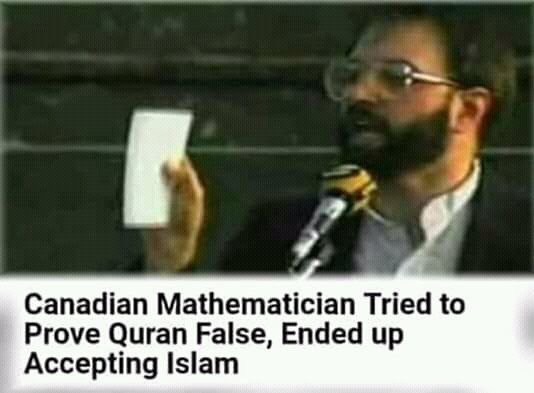Canadian Mathematician Tried to Prove Quran False, Ended up Accepting Islam
//
 Gary Miller was a professor of Mathematics at the University of Toronto. He also was a Christian missionary who noticed that Muslim people were almost impossible to convert to Christianity. In 1977 he decided to study the Quran with the goal of finding scientific and historical errors that would help in convincing Muslims they are following a false religion.
Gary Miller was a professor of Mathematics at the University of Toronto. He also was a Christian missionary who noticed that Muslim people were almost impossible to convert to Christianity. In 1977 he decided to study the Quran with the goal of finding scientific and historical errors that would help in convincing Muslims they are following a false religion.
The first thing professor Miller noticed was that many verses of the Quran challenge people to use reason:
“Will they not then contemplate the Quran? and if it had been from other than God, indeed they would have found in it many contradictions.” (Quran 4:82)
“… and in case you are suspicious about what we have been sending down upon our bondman, (i.e. prophet Muhammad) then come up with a surah of like, and invoke your witnesses, apart from God, in case you are sincere.” (Quran 2:23)
After careful study professor Miller was amazed by the Quran and reached the conclusion that it cannot be the work of a human being. He accepted Islam and started calling people to the straight path through lectures and other activities. His lecture “the Amazing Quran” shows the deep knowledge he acquired during his study of the book of Allah. Here are some of the points he makes in the lecture:
“There is no such author who writes a book and then challenges others that this book is errorless. As for the Quran, it is the other way around. It tells the reader that there are no errors in it and then challenges all people to find any, if any.
The Quran is not Prophet Muhammad’s autobiography as many non muslims claim. It does not mention the hard events in Prophet Muhammad’s personal life, such as the death of his wife Khadijah, or the death of his daughters and sons. Strangely enough, the verses that were revealed during a time of defeat for the Muslims proclaimed victory while those revealed at time of victory warned against arrogance and called for more sacrifices and efforts. If one writes his own autobiography, he would magnify the victories and justify the defeats. The Quran did the opposite and this is consistent and logical: it was not a history of a specific period but rather a text that sets general rules for the relationship between God almighty and the people.
There is a chapter in the Quran called Maryam (Mary) in which the mother of Jesus is eulogized in a way not even found in the bible. At the same time, there is no chapter in the name of Muhammad’s wife Aisha or his daughter Fatemah. The name of prophet Isa (Jesus) is mentioned 25 times in the Quran while the name of prophet Muhammad is mentioned only five times.
If you were in the situation of prophet Muhammad while he and Abu-Bakr were inside the cave of hira surrounded by the unbelievers who could have seen them if they had just looked down. The human reaction would be to search for a back exit or some other way out or to shush in order not to be heard. However, the prophet told Abu-Bakr “Grieve not; surely Allah is with us.” (Quran 9:40). This is not the mentality of a deceiver; it is the mentality of a prophet who has the confidence that God would certainly take care of him.
Surah Al-Masad (Palm Fibres) was revealed ten years before the death of Abu-Lahab, the prophet’s uncle. It said that Abu-Lahab and his wife will die unbelievers and will be in the hellfire. They could have easily proved the Quran to be wrong by accepting Islam. But, they did not believe or even pretend to believe. How could the prophet be that confident unless he was sure that the Quran was God’s revelation?
Commenting on the verse: “That is of the tidings of the unseen that we reveal to you; in no way did you (yourself) know it, neither your people, even before this. So endure patiently; surely the end is for the pious.” (Quran 11:49). Miller writes that none of the scriptures uses this kind of style; that is, giving the reader the piece of information and then telling him it is new information. It is really a unique challenge. What if the people of Makkah, even by pretense, had said they knew that before? What if one scholar discovered later that this information was already known before? However, this did not happen.
Professor Miller mentioned what contemporary Catholic Encyclopedia includes under the entry of Quran. It mentions that despite the plethora of studies, theories, and attempts to attack the veracity of Quranic revelation under many pretexts, none of them can be logically adopted. The Church itself did not dare to adopt any of such theories but at the same time it did not admit the truthfulness of the Muslims’ theory that the Quran is, without doubt, the last heavenly revelation.